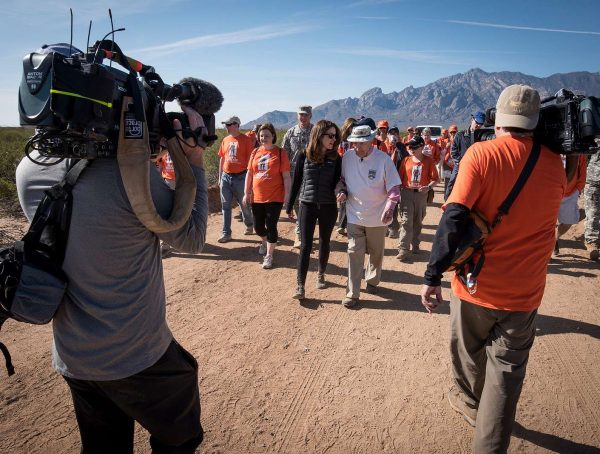When she first started working for NBC, Betsy Fischer Martin, an Emmy-winning journalist, was a college intern studying politics. At the end of her internship period, NBC offered her the opportunity to stay in a temporary research position during the political campaign Clinton v. Bush. Her main task was clipping papers and organizing material by category, candidate, etc. that was used as resources for the shows.
“This is always my advice on trying to make the most out of internships. I did not just blindly clip those papers. I made a point of, when I was doing this sort of mundane work, I was actually reading the article and understanding why it was important, the context of it, instead of just clipping and [organizing]. … Some of the work is a little bit mundane, but take the time to read and understand what you are doing,” Fischer Martin says.
She says people should make the most of every opportunity.
“There is a saying that you’ve probably heard, ‘always dress like the job you want.’ I would just twist that and say, study and learn about the job you want. Just keeping your eyes open and learning, even if you are the intern or at an entry-level job, what is that next step up and what do I need to learn to get there,” Fischer Martin continues.
Fischer Martin says early-career journalists should not be afraid to start at a low position, or in a field that was not their top choice. What matters is to start.
“Just get a foot in the door. Even if you don’t want to do that job necessarily. Do it well, and then once you’re in, it’s so much easier to move elsewhere,” says Jonathan Martin, a national political correspondent working for The New York Times.
Martin adds that in addition to starting at an entry-level position, building a network of sources is beneficial as well. You never know when you are going to need someone’s help for a contact, a piece of information, or to confirm a piece of news.
“Get to know as many people from different realms as possible. The sources of information will surprise you, it’s not always who you expect it to be. I always get a kick at of when I write something and people guess who the sources are, and they’re almost always wrong because it’s not always obvious,” Martin says.
Sometimes finding a good source is not about going to the right person, but just trying different ways to reach the information. Companies might refer you to their public relations department, and people who receive a bit of exposure might not give you the time of day. But you never know when an employee, an assistant, or a friend might be able to give you information.
“People like to talk. And people who have information that is exclusive and explosive, a lot of times, they like to share it. Why? That’s a longer story. But a lot of it is human psychology, people like for you to know that they know, they like the power of telling you something,” Martin adds.
Be creative on your sourcing, do not rely on a single person. Also keep in mind that your source could be motivated by something, ill-intentioned — even though some people might just be trying to help.
“A lot of times sources want to see change happen, they can’t get change through the normal channels, so they go to the press,” explains Fischer Martin.
When starting in journalism, a lot of students struggle to find story ideas. However, in today’s social media world, news and information are accessible faster than ever, and anyone can share news. Social media platforms are a great tool to use as a source of story ideas and story leads, on top of coming in handy for contacting people.
“There is this kind of Facebook-ish website called Nextdoor. I follow the Nextdoor stuff in our neighborhood and the amount of information on it is incredible. If I worked for the Washington Post, I would be on this site every day, because you find things on there that have not been published at all. … Even if it’s not 100% reliable, it gets you in the door and gets the conversation started,” Fischer Martin explains.
While social media cannot always be reliable as a primary source, they can lead you to people and topics that are worth digging into. Fischer Martin mentions using Instagram locations to search for people who attended an event for instance or to get an idea of what is happening in a certain area.
“Social media accounts are the great raw material for tips. It’s not solid necessarily, but i’s a great opening to chase stuff. TikTok, Instagram, Twitter…” says Martin. “Once you get a story or two going, people see that and they will come to you.”
Finally, know the difference between communication and journalism. Martin believes that if you are writing something that is not at least making somebody angry or making somebody think, then that is a press release, not journalism. Keep a check on yourself and on your work, for your first obligation is to your readers or viewers.
“If you don’t like doors being closed on you or calls being hanged up, don’t be a journalist!” concludes Martin, laughing.
Betsy Fischer Martin is an Emmy-winning journalist who started her journalism career at NBC’s “Meet The Press,” for which she later became a TV news executive. She is currently the Executive Director of the American University’s Women & Politics Institute and Executive-in-Residence of the School of Public Affairs. Fischer Martin also created Fischer Martin Media, a consulting business that provides media training to corporate executives.
Jonathan Martin is a national political correspondent working for The New York Times. He formerly was a political writer for Politico when it just had been created. He is the co-author of the book “The End of the Line: Romney vs. Obama: The 34 Days That Decided the Election” (2012). Martin is also referred to as a political expert for TV and radio shows aired on CNN, CBS, NPR, and others.








